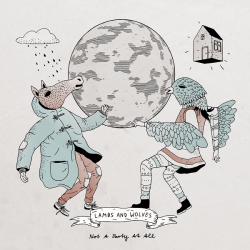 Germany’s Lambs & Wolves have produced an album of some subtlety, which is a call back to a style that used to swamp the alt-folk scene but which has latterly fallen somewhat from favour. Across the ten songs Lambs & Wolves do their upmost to breathe life back into quiet and introspective “bedroom recordings”, but with a twist. Where this was once the realm of minimalist drumming and a scratchy folk-guitar strum, ‘Not a Party at All‘ rejoices in gently melodic tunes – which, with Julian Tröndle’s piano often to the fore, has a fuller and richer sound. Imagine a cross between the Conor Oberst of early Bright Eyes mixed with not quite the big band richness of ‘The Secret Migration‘ era Mercury Rev and you’re a good way there. This is an album that it would be easy to dismiss as an average take on indie-folk, there’s enough hooks in the tunes to convey that almost pop-sensibility, but that would be to underestimate what band members Julian Tröndle (vocals, piano, keys, harp), Louis Groß (guitars, banjo, drums, percussion), and Stefan Bercher (guitar, backing vocals) have created.
Germany’s Lambs & Wolves have produced an album of some subtlety, which is a call back to a style that used to swamp the alt-folk scene but which has latterly fallen somewhat from favour. Across the ten songs Lambs & Wolves do their upmost to breathe life back into quiet and introspective “bedroom recordings”, but with a twist. Where this was once the realm of minimalist drumming and a scratchy folk-guitar strum, ‘Not a Party at All‘ rejoices in gently melodic tunes – which, with Julian Tröndle’s piano often to the fore, has a fuller and richer sound. Imagine a cross between the Conor Oberst of early Bright Eyes mixed with not quite the big band richness of ‘The Secret Migration‘ era Mercury Rev and you’re a good way there. This is an album that it would be easy to dismiss as an average take on indie-folk, there’s enough hooks in the tunes to convey that almost pop-sensibility, but that would be to underestimate what band members Julian Tröndle (vocals, piano, keys, harp), Louis Groß (guitars, banjo, drums, percussion), and Stefan Bercher (guitar, backing vocals) have created.
There’s, naturally, many intimations of heartbreak – a youthful nervousness in social interactions and several hints of societal disconnect. And that’s just ‘Strange Ritual‘, the title gifting song. “It’s not a party at all, it’s a strange ritual” Tröndle exhales as events occur around him “as the night closes in you’re not the same” he notes, as he compares injuries taken and given “do you feel nothing at all? I can’t feel everything.” Misery, or the boundaries of misery, are not the album’s only conceits – there’s also the upbeat analysis of misunderstandings as on ‘Every Animal‘ where two people discourse at cross-purposes – this is enriched by the trumpet of guest player Benedikt Weiger. There’s a simple pleasure to the soft-count in that opens ‘Perfume‘, and which is mirrored halfway through with the equally soft direction “all right” as the band are called in to set off to find a gutter low sense of joy – the bitter sweetness of self-deception captured by “I was sure that you were waiting there for me.” And what should one make of ‘A lot like you‘ ? Is this ice-crystal cracking tune a confession of being too much the same as the object of a passion, or is there also a small pun hidden in there – it’s difficult to get close to you because you’re popular, perhaps too popular, because a lot, or just simply many, like you?
‘Not a Party at All‘ is a classic example of a “grower” of an album, a quick first listen doesn’t reveal the half of what it has to offer. In the end it takes a lot of listens, and being weeks late in submitting a review, to really get what has been laid down here – but that’s an effort that’s worth making.


